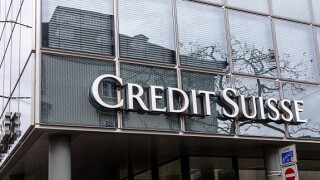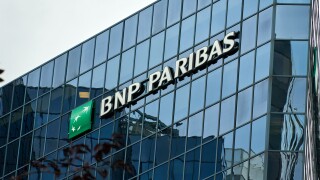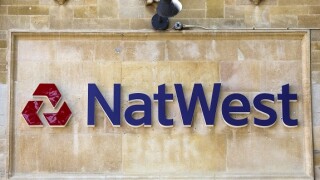This week, inspired by the re-emergence of a storied brand from the past, GlobalCapital delved into the murky world of investment bank trademarks.
The recently resurrected name is none other than Salomon Brothers, the bond trading behemoth made (even more) famous by the book Liar's Poker, an insider’s account by former trader Michael Lewis.
This prompted some bankers to speculate as to which old brand would be exhumed next. One senior figure in London suggested Warburg — presumably referring to S G Warburg, the investment bank that was acquired by the Swiss Bank Corporation in 1995 and has since been fully absorbed by UBS.
On reflection, Warburg would be a rather odd choice, given that there is an operational German private bank called M M Warburg and, of course, the private equity firm Warburg Pincus. It could be confusing.
A much more likely bet would be First Boston, the US M&A powerhouse that was eventually taken over by Credit Suisse. Indeed, when your correspondent followed the trademark paper trail emanating from the new Salomon Brothers firm, he discovered that work was already well underway to revive First Boston, too. You can read all about this in our main story, which also features a cameo by former US president Donald Trump.
A reputation to maintain
Both the new Salomon Brothers and the nascent First Boston are clearly attempting to trade off the cachet of a prestigious name. The peculiar thing about this is that both brands are inextricably linked to the scandals and disasters that brought about their downfalls in the first place.
In the case of Salomon Brothers, the firm became embroiled in illegal attempts to corner the market for US Treasuries and had to be rescued by Warren Buffet before eventually being acquired by Travelers Group in 1997.
First Boston, meanwhile, had to be bailed out by Credit Suisse after the junk bond crash of 1989 left it saddled with bridge loans associated with the leveraged buy out of Ohio Mattress Company, a situation colourfully described at the time as “the burning bed”.
Renamed as Credit Suisse First Boston, the firm soldiered on under its Swiss parent and even acquired another famous brand, Donaldson, Lufkin & Jenrette, for $13bn in 2000. It was unfortunate timing, coming just before the dot com bubble burst.
Credit Suisse retired the First Boston moniker in 2006 but is still counting the cost, quite literally. In the last quarter of 2021, the firm wrote off Sfr1.6bn ($1.7bn) of goodwill “mainly related to the acquisition of Donaldson, Lufkin & Jenrette”, according to its latest earnings report.
Brand loyalty
But it seems that there is no final chapter ignominious enough to sap the goodwill of investment bankers of a certain age for the firms they once cherished.
This was amply demonstrated by the reactions to the revival of Salomon Brothers among alumni on LinkedIn. “Best workplace in my career,” wrote one. “Total freedom and total accountability, with some of the greatest mentors ever.”
The enduring mystique of fallen firms is also reflected in the price of memorabilia on online auction house eBay, where a Lehman Brothers branded rugby ball (deflated) is listed for £225.
Playing it cool
Given the residual value clearly associated with these historic names, are the legal successors to the firms bothered that upstarts are attempting to cash in on them? If they are, they are not letting on.
A spokesperson for the corporate heir to the Salomon Brothers business, Citigroup, suggested that it was ancient history. “Nearly 20 years ago, we unified our branding under ‘Citi’ and no longer use the names of our predecessor companies,” she told GlobalCapital.
Credit Suisse played its cards closer to its chest, flatly declining to comment on the new owner of the First Boston trademark.
It’s hard to imagine that they wouldn’t be a bit peeved, though, especially when they see that the new Salomon Brothers firm has plastered its website with tombstones for big M&A deals from 1997.
But can they do anything about it?
Keeping it in the family
To retain the legal rights to a trademark, at least under US intellectual property law, it must be continually used in commerce. This prevents a big corporation like Citi that wants to present a single face to the world from stopping squatters taking over abandoned brands like Salomon Brothers.
But there may be solutions, as long as the big corporation in question does not mind having a rather untidy-looking list of subsidiaries.
Take Bank of America, whose investment banking division was known as Bank of America Merrill Lynch until a rebrand in 2019. The group is still using Merrill Lynch as the name for its wealth management division, which should be enough to prevent an entrepreneur with an eye for brand equity from registering it as a trademark in the financial services sector.
But that’s not all. To this very day, BofA also actively uses a subsidiary bearing the much older name of Merrill Lynch, Pearce, Fenner and Smith. The trademark hunters will have to look elsewhere.
Trademark attorneys wanting to set us straight on US IP law should send an email to richard.metcalf@globalcapital.com or call +44 (0)20 7779 7315. We would also love to hear from capital markets professionals in confidence about any new jobs or new hires.
Interested in accessing more GlobalCapital content? Contact us on +44 (0)207 779 8338 or send an email to subs@globalcapital.com to inquire about a trial.
More people news
-
After a slowdown in DCM, ECM and markets activity, bankers are looking at smaller bonuses
-
French bank is a 'natural consolidator' as rivals retrench, says the COO of its corporate and institutional bank, Yann Gérardin
-
New position created as sovereign plans first green bond
-
Additional director brought in from HSBC
-
FIG banker one of two to quit HSBC for new jobs
-
Matthew Kirsch joins credit team led by Nicole Gates








